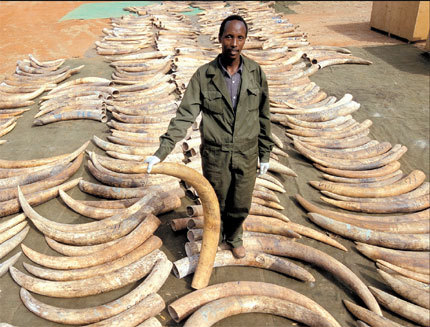The Hong Kong Legislative Council on Wednesday, January 31, 2018 voted to pass a bill that will end local ivory trade in Hong Kong, with no compensation for ivory dealers, and an increase of maximum penalties for wildlife crimes of up to 10 years imprisonment.

This decision will bring to a close a trade that had once brought the city notoriety as the world’s foremost supplier of worked ivory products in the 1970s and 1980s.
“Today’s decision is another milestone for the conservation of elephants, and should serve as further encouragement for governments in the region to put an end to the domestic ivory markets that fuel the poaching crisis,” said James Compton, TRAFFIC’s Senior Programme Director, Asia Pacific. “Hong Kong’s legislators should be congratulated for choosing to stand on the right side of history.”
However, concerns remain that the closure of Hong Kong’s ivory markets will be implemented in phases between now and 2021. With immediate effect, the amended law will ban the trade in elephant trophies, while an end to ivory imports and exports will follow three months after the law comes into effect. Commercial trade of ivory within the territory can continue until the end of 2021, after which all ivory trading will cease, with the exception of the antiques trade in ivory carved before the year 1925.
This leaves a gap of four years between the closure of ivory markets in Hong Kong and mainland China, with the latter having shut down all of its registered ivory outlets at the end of 2017.
“Hong Kong and mainland China’s ivory markets have long been closely linked, but the disparity in policies between them could lead to the perception of Hong Kong as an open store in the midst of a curfew,” said Tom Milliken, TRAFFIC’s Elephant and Rhino Programme Leader. “Close regulation and monitoring is essential to prevent any laundering of ivory to the still open markets in Hong Kong, which would seriously undermine efforts in mainland China to implement its ivory trade ban.”
TRAFFIC’s recently published report Closing Strategy: ending ivory trade in Hong Kong encouraged the Hong Kong SAR Government to implement measures to elevate its capacity to tackle ivory trafficking, including co-operation with other law enforcement agencies, especially in mainland China, to boost investigation and real-time intelligence sharing.
“It is more important than ever to remain vigilant of illegal trade activities on both Hong Kong and mainland China,” said Compton. “Authorities should take advantage the passage of this bill, which imparts the full force of the law to support enforcement actions in Hong Kong.”
TRAFFIC’s recent report also recommended a rapid implementation of an ivory ban alongside measures to improve oversight, record-keeping and transparency of the trade in registered ivory, of which latest figures from the government suggests there are still 64 tonnes remaining in the territory. Measures include the need for labelling of ivory products and display of licence notices to be strictly enforced to minimise confusion for consumers about the legitimacy of ivory products and outlets. Active monitoring of the trade is encouraged with monthly reporting of transactions by licensed ivory dealers, as well as increased transparency through annual publishing of data from the government on Hong Kong’s remaining ivory stockpiles.
